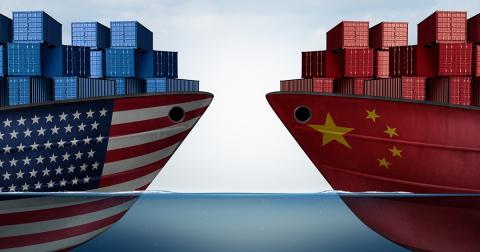
In the negotiations that ended on January 27, Eastern Time, the United States has reached an agreement with the Netherlands and Japan to restrict the export of certain advanced chip manufacturing equipment to China. If the agreement is reached, it means that Dutch and Japanese semiconductor equipment manufacturing companies, including ASML (ASML.AS), Nikon (Nikon Corp) and Tokyo Electron Ltd (Tokyo Electron Ltd.) Adopted Chip Export Control Regulations.
Further details of the agreement are yet to be known. Spokespeople for the White House, the Dutch Foreign Ministry and Japan's Ministry of Economy, Trade and Industry all declined to comment. However, previously, a Dutch government source revealed that the Netherlands may at least impose some additional restrictions on the export of ASML's semiconductor equipment to China. In 2019, under pressure from the US, ASML was restricted from selling its most advanced EUV machines to China. The current focus is whether ASML's old DUV machines will be restricted from export. The Dutch government has previously said it intends to reach some kind of agreement with the US on export controls, but would not simply adopt US rules.
The Dutch government source mentioned above said the Netherlands has been grappling with several issues. One is to ensure that the agreement does not impose more restrictions on ASML than on American companies; second, Japan, the country where ASML’s competitor Nikon is located, also needs to accept similar regulations; third, the new restrictions will not subvert the global chip market. The market is just emerging from COVID-19 era shortages that require Chinese production, especially for less advanced chips.
Masahiko Hosokawa, a professor at Meisei University and former head of Japan's trade control bureau, said while Nikon could be affected, the Japanese company most likely to be hit by the new restrictions would be chipmaking machinery maker Tokyo Electron, which accounts for about a quarter sales depend on the Chinese market. He said a deal would need to strike a balance between the interests of Japan, the United States and Europe.
Regarding reports that the Netherlands and Japan will cooperate with the U.S. government to limit the export of chip technology to China, the spokesperson of the Chinese Ministry of Foreign Affairs stated on January 20 that the U.S. has repeatedly used state power and abused export controls to protect its own hegemony and self-interest. And economic and trade issues are politicized, instrumentalized, and weaponized, even at the expense of friends and self-enrichment, economically coercing allies, viciously blocking and suppressing Chinese companies, and artificially promoting the "transfer" and "decoupling" of industries. Relevant actions have seriously undermined market rules and the international economic and trade order, not only harming the legitimate rights and interests of Chinese companies, but also affecting the stability of the global industrial and supply chains. Research by the International Monetary Fund estimates that technology decoupling could result in a loss of about 5% of GDP in many countries.
China hopes that relevant parties will uphold an objective and impartial stance, proceed from their own long-term interests and the common interests of the international community, and make correct judgments independently. China will also pay close attention to relevant developments and resolutely safeguard its own legitimate interests.
